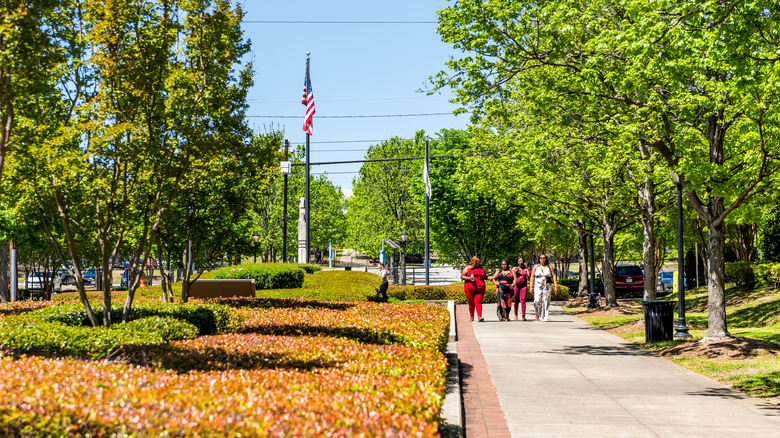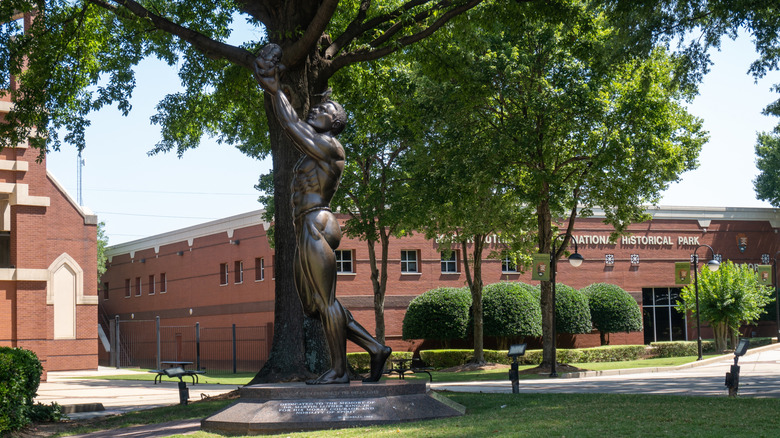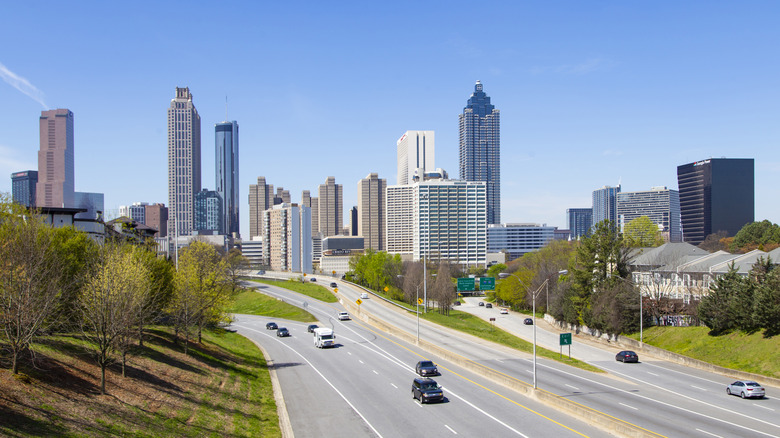Georgia's Huge National Historical Park Offers A Moving And Immersive Experience
In the heart of Atlanta, Georgia, lies a neighborhood deeply rooted in American history. The streets here are lined with historic churches and cultural landmarks that together tell one of the most important stories of the United States. It is within this community that visitors will find the Martin Luther King Jr. National Historical Park & Preservation District, a nearly 35-acre space dedicated to preserving the life and legacy of the great civil rights movement leader.
The park is located in the Sweet Auburn neighborhood, just east of downtown and about a 20-minute drive from Hartsfield-Jackson Atlanta International Airport (ATL) — the world's busiest airport. Its accessibility makes it an easy addition to any Atlanta itinerary, whether you're in town for a long weekend or just passing through. What makes the district truly remarkable is not just its historic buildings but its ability to immerse visitors in both the personal life of Dr. King and the broader civil rights struggle. Walking through these streets, it becomes clear that the district is more than just a collection of historic buildings; it's a living, breathing memorial that tells the story of one of America's greatest leaders while grounding visitors in the broader history of the civil rights movement.
Experience the empowering park
Visitors often begin at the visitor center, which houses powerful exhibits about Dr. King's life and the larger civil rights movement. Multimedia presentations, artifacts, and firsthand accounts bring to life the challenges and triumphs of those who fought for equality. From there, make your way to the Ebenezer Baptist Church, where Dr. King preached alongside his father. Along the way to the church, you will walk through the International World Peace Rose Garden and the Behold Monument. When you enter the church, take a moment to sit upstairs, listen to recorded sermons of Dr. King himself, and reflect on what it would have been like to experience it in person. You can also join in on a ranger-led Church Talk, held daily.
From here, pay a visit to the historic Fire Station No. 6, a landmark site which served the community during Dr. King's lifetime and now stands as a small but powerful museum. Inside, you'll find exhibits that highlight the role of first responders in the neighborhood and how the fire station reflected the segregated structures of the time. The displays also show how desegregation slowly reshaped Atlanta's civic institutions. The King Birth Home is another highlight. Preserved to reflect the early 20th-century period in which King grew up, free guided tours here offer a rare glimpse into his formative years. Tours are given on a first come, first served basis, with timed tickets available within the visitor center. Just steps away from his childhood home stands the King Center, the final resting place of Dr. and Mrs. King. It is also an active hub for education and global peace initiatives. Here, visitors can also explore the Coretta Scott King Peace and Meditation Garden, view the reflecting pool and eternal flame, and learn more details about Dr. King at the Freedom Hall.
Making the most of your visit
To make the most of your visit, plan to spend at least half a day exploring the district. Admission to the park is free, but tickets are required for guided tours of the King Birth Home, which should be reserved in advance through the National Park Service. Ranger-led programs and exhibits change periodically, so it's worth checking the schedule before you go. When it's time to eat, you don't have to go far. The Sweet Auburn Curb Market, just a short walk from the district, is a must-visit for local flavor. Established in 1918, this indoor market is packed with food stalls offering everything from Southern classics like fried chicken and BBQ to international fare. For a sit-down meal, downtown Atlanta's thriving restaurant scene is minutes away, with options ranging from upscale Southern dining to trendy farm-to-table eateries.
As for accommodations, downtown Atlanta has a variety of places to stay (like the stylish, boutique FORTH Hotel) within a short drive or even walking distance of the park. Staying near historical Peachtree Street or in the Centennial Olympic Park area gives you easy access not only to the historic district but also to other major attractions, such as the Georgia Aquarium (the largest in the United States), the World of Coca-Cola, and the Center for Civil and Human Rights. Visiting in January during the MLK Day celebrations adds an extra layer of significance, while spring and fall bring milder weather and a pleasant atmosphere for walking the neighborhood. This historic district isn't just a stop on a trip to Atlanta — it's a place that grounds you in the struggles and triumphs of the past, while reminding you of the importance of carrying those lessons into the future.


